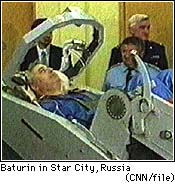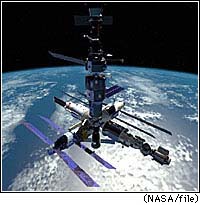Russian bureaucrat in space?
August 26, 1997
Web posted at: 1:10 p.m. EDT (1710 GMT)
Yeltsin aide may go to Mir
Latest developments:
Snafu caused oxygen scare
What went wrong
Related stories and sites
MOSCOW (CNN) -- Russian space
officials announced Tuesday a proposal to
show confidence in the troubled space
station Mir -- the first bureaucrat in orbit.
Yuri Baturin, the secretary of President
Boris Yeltsin's security council, may go aboard Mir next year. The Russian Space
Agency says it's considering the idea, which was ridiculed as "a political move" by
the Russian media.
Baturin, 48, would need to lose weight before heading into space. But he already has
undergone medical tests and preliminary training, including exposure to zero-gravity.
He has said rumors about Mir's demise are false. On Tuesday, Yeltsin said the space
station "is living and will live on" despite attempts to "write it off."
 Snafu caused oxygen scare
On Monday, a communications snafu between U.S. and Russian space officials
turned a quickly fixed air supply problem aboard Mir into talk of possible
evacuation.
"Everything is fine," Vladimir
Solovyov, the head of Russia's
Mission Control, told reporters. "We
have no problems with the quality of
air on board."
Monday's scare about the orbiter's air
supply system was due in part to a
lack of communications between
Mir's ground staff and their U.S.
counterparts.
The U.S. space agency NASA
touched off a brief panic when
officials in Houston announced that
both the main and backup
oxygen-generating systems on Mir
were not working.
If that were the case, the two Russians and one American on board would have to fix
the systems within days or face the prospect of abandoning the space station.
When NASA made the first announcement it was almost midnight in Moscow,
where space officials had long since gone home without reporting any new problems
aboard the Mir.
It wasn't until Tuesday morning that Russian officials announced that both oxygen
systems had been fixed by 10:30 p.m. Monday -- before NASA even announced the
problem.
What went wrong
Mission control officials said the main oxygen generating system -- called the
Elektron -- had been acting up for several days and shut down on Monday. The crew
discovered it was an electrical contact problem.
In the meantime, they tried to use the backup system that uses canisters, which they
ignite, to form oxygen. But they couldn't get them lighted.
It turned out the firing pin had become too dull after repeated use. They replaced it
with an extra pin.
A frustrated Viktor Blagov, deputy chief flight
controller for the Mir program, criticized the
media for "distorting" the story. "The press
overreacts," he said. "This is a very minor
technical problem, but the reports about it
sound like a huge, tragic calamity. This is
really wrong."
Meantime, three of four solar panels on Mir's
damaged Spektr module are supplying energy
from the sun for the first time since Spektr
was punctured in a collision two months ago.
The cosmonauts performed an internal
spacewalk Friday to reconnect power cables to the damaged module.
The crew has not yet been able to fully align the panels toward the sun. The power
being received was being used to recharge batteries.
Snafu caused oxygen scare
On Monday, a communications snafu between U.S. and Russian space officials
turned a quickly fixed air supply problem aboard Mir into talk of possible
evacuation.
"Everything is fine," Vladimir
Solovyov, the head of Russia's
Mission Control, told reporters. "We
have no problems with the quality of
air on board."
Monday's scare about the orbiter's air
supply system was due in part to a
lack of communications between
Mir's ground staff and their U.S.
counterparts.
The U.S. space agency NASA
touched off a brief panic when
officials in Houston announced that
both the main and backup
oxygen-generating systems on Mir
were not working.
If that were the case, the two Russians and one American on board would have to fix
the systems within days or face the prospect of abandoning the space station.
When NASA made the first announcement it was almost midnight in Moscow,
where space officials had long since gone home without reporting any new problems
aboard the Mir.
It wasn't until Tuesday morning that Russian officials announced that both oxygen
systems had been fixed by 10:30 p.m. Monday -- before NASA even announced the
problem.
What went wrong
Mission control officials said the main oxygen generating system -- called the
Elektron -- had been acting up for several days and shut down on Monday. The crew
discovered it was an electrical contact problem.
In the meantime, they tried to use the backup system that uses canisters, which they
ignite, to form oxygen. But they couldn't get them lighted.
It turned out the firing pin had become too dull after repeated use. They replaced it
with an extra pin.
A frustrated Viktor Blagov, deputy chief flight
controller for the Mir program, criticized the
media for "distorting" the story. "The press
overreacts," he said. "This is a very minor
technical problem, but the reports about it
sound like a huge, tragic calamity. This is
really wrong."
Meantime, three of four solar panels on Mir's
damaged Spektr module are supplying energy
from the sun for the first time since Spektr
was punctured in a collision two months ago.
The cosmonauts performed an internal
spacewalk Friday to reconnect power cables to the damaged module.
The crew has not yet been able to fully align the panels toward the sun. The power
being received was being used to recharge batteries.

 Snafu caused oxygen scare
On Monday, a communications snafu between U.S. and Russian space officials
turned a quickly fixed air supply problem aboard Mir into talk of possible
evacuation.
"Everything is fine," Vladimir
Solovyov, the head of Russia's
Mission Control, told reporters. "We
have no problems with the quality of
air on board."
Monday's scare about the orbiter's air
supply system was due in part to a
lack of communications between
Mir's ground staff and their U.S.
counterparts.
The U.S. space agency NASA
touched off a brief panic when
officials in Houston announced that
both the main and backup
oxygen-generating systems on Mir
were not working.
If that were the case, the two Russians and one American on board would have to fix
the systems within days or face the prospect of abandoning the space station.
When NASA made the first announcement it was almost midnight in Moscow,
where space officials had long since gone home without reporting any new problems
aboard the Mir.
It wasn't until Tuesday morning that Russian officials announced that both oxygen
systems had been fixed by 10:30 p.m. Monday -- before NASA even announced the
problem.
What went wrong
Mission control officials said the main oxygen generating system -- called the
Elektron -- had been acting up for several days and shut down on Monday. The crew
discovered it was an electrical contact problem.
In the meantime, they tried to use the backup system that uses canisters, which they
ignite, to form oxygen. But they couldn't get them lighted.
It turned out the firing pin had become too dull after repeated use. They replaced it
with an extra pin.
A frustrated Viktor Blagov, deputy chief flight
controller for the Mir program, criticized the
media for "distorting" the story. "The press
overreacts," he said. "This is a very minor
technical problem, but the reports about it
sound like a huge, tragic calamity. This is
really wrong."
Meantime, three of four solar panels on Mir's
damaged Spektr module are supplying energy
from the sun for the first time since Spektr
was punctured in a collision two months ago.
The cosmonauts performed an internal
spacewalk Friday to reconnect power cables to the damaged module.
The crew has not yet been able to fully align the panels toward the sun. The power
being received was being used to recharge batteries.
Snafu caused oxygen scare
On Monday, a communications snafu between U.S. and Russian space officials
turned a quickly fixed air supply problem aboard Mir into talk of possible
evacuation.
"Everything is fine," Vladimir
Solovyov, the head of Russia's
Mission Control, told reporters. "We
have no problems with the quality of
air on board."
Monday's scare about the orbiter's air
supply system was due in part to a
lack of communications between
Mir's ground staff and their U.S.
counterparts.
The U.S. space agency NASA
touched off a brief panic when
officials in Houston announced that
both the main and backup
oxygen-generating systems on Mir
were not working.
If that were the case, the two Russians and one American on board would have to fix
the systems within days or face the prospect of abandoning the space station.
When NASA made the first announcement it was almost midnight in Moscow,
where space officials had long since gone home without reporting any new problems
aboard the Mir.
It wasn't until Tuesday morning that Russian officials announced that both oxygen
systems had been fixed by 10:30 p.m. Monday -- before NASA even announced the
problem.
What went wrong
Mission control officials said the main oxygen generating system -- called the
Elektron -- had been acting up for several days and shut down on Monday. The crew
discovered it was an electrical contact problem.
In the meantime, they tried to use the backup system that uses canisters, which they
ignite, to form oxygen. But they couldn't get them lighted.
It turned out the firing pin had become too dull after repeated use. They replaced it
with an extra pin.
A frustrated Viktor Blagov, deputy chief flight
controller for the Mir program, criticized the
media for "distorting" the story. "The press
overreacts," he said. "This is a very minor
technical problem, but the reports about it
sound like a huge, tragic calamity. This is
really wrong."
Meantime, three of four solar panels on Mir's
damaged Spektr module are supplying energy
from the sun for the first time since Spektr
was punctured in a collision two months ago.
The cosmonauts performed an internal
spacewalk Friday to reconnect power cables to the damaged module.
The crew has not yet been able to fully align the panels toward the sun. The power
being received was being used to recharge batteries.
